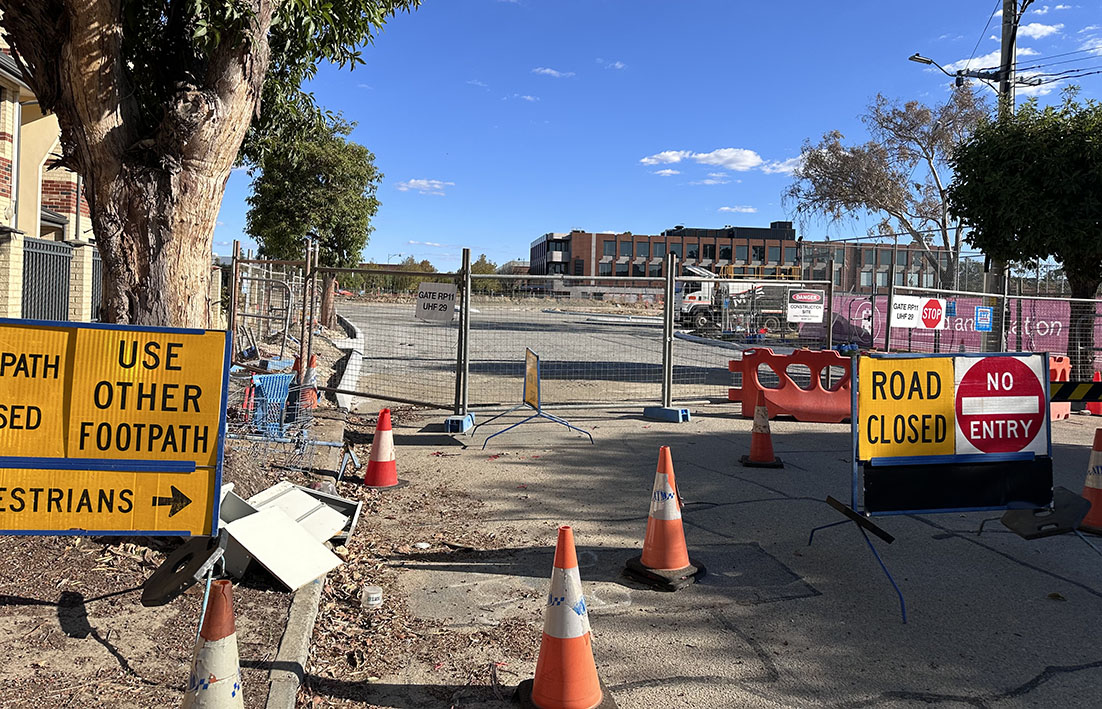
CONSTRUCTION of the level crossing on Cale Street has left nearby residents feeling overlooked and at a loss.
Project manager Aaron Cooper, who works throughout the state, said he lived in a corner unit directly facing the works and spoke repeatedly with Metronet and neighbouring residents to find a path forward that preserved quality of life while progressing the project.
“We aren’t against the development or anything else,” he said.
“We’re just against the impact on the quality of life that it’s going to have on the owners and residents of this complex and the neighbouring complex.”
To this end, Cale Street resident, behaviourist and criminologist Brian Steels drafted a detailed report on the effects the level crossing would have on residents.
Dr Steels said he hoped to see some resolution that would alleviate the disruptions the new installation would introduce.
“We’re stuck with the location,” he said.
“We’re stuck with lights, bells, you name it: extra traffic, air, noise, and light pollution.
“We’re stuck with everything and surely somebody at some stage is going to have to say, ‘You’ve got a valid argument and how can we help?’”
Mr Cooper said the residents were not after compensation but rather mitigation of the issues.
“I’ve suggested it to Metronet that there are things that are quite simple and easy as mitigations around this issue,” he said.
“The likes of double-glazed windows and roller shutters and things like that for any street facing windows for the units.
“Now you can even get a window film that acts as double glazing, so they won’t even have to go replace all the windows, but just apply a treatment to try and mitigate that issue.
“I’ve consulted Metronet via email and onsite meetings.
“The final response which has taken nearly six weeks to get to the point was that Metronet said, ‘with the above in mind and with the level crossing still under construction, Metronet are not actively considering additional mitigation measures.’”
Dr Steels said two-way traffic turning into one-way from the installation would reduce streetside parking and disadvantage residents in need of medical support or care services and was an issue that was going unaddressed.
“I had to go to the hospital,” he said.
“I’ve had several operations. My wife got an ambulance, but they had nowhere to park.
“We really are adamant that we need two-hour parking out the front, but the council won’t guarantee it.”
Mr Cooper said he was not impressed with the overall lack of consultation through the whole process.
“I build, construct, replace things for a living; that’s my job,” he said.
“I do it on behalf of a state government entity, so I understand the way things are meant to work.
“One of the projects I’ve done was I undergrounded a main street for a country town.
“I walked and spoke to every owner, manager, resident of each of the premises.
“I did that probably half a dozen times so they knew who I was, and they could talk to me if they had concerns.
“I did full dilapidation surveys of the streets and went in every time I was in town to sit down with the shire chief executive officer to make sure he was aware and could inform his councillors, so they were aware of what we were doing.
“If there were any concerns, we addressed them.”
Echo News has reached out to Metronet and the Public Transport Authority for comment.